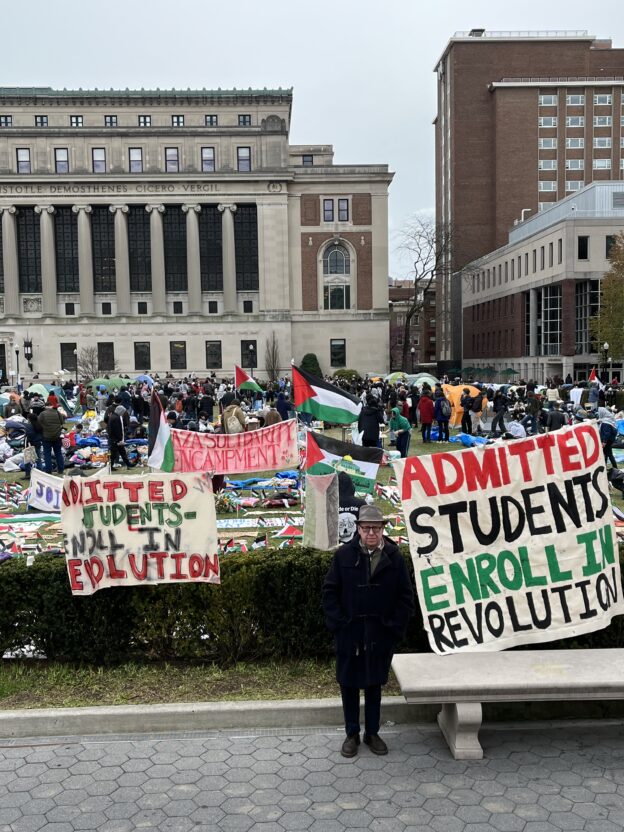Columbia’s Gaza Solidarity Encampment

I have been meaning to write about Columbia’s Gaza Solidarity Encampment since last week, and if I had written this last weekend, the tenor would be very different. Two nights ago, the encampment was destroyed by the New York Police Department, and the students barricaded in Hamilton Hall were arrested along with others in the encampment and outside the university gates. At the same time, hundreds of students were also brutalized and arrested at City College twenty blocks north. But for almost two weeks, the encampment on the Columbia Quad was a beautiful space of community and learning where Palestinian freedom was the focus. And students at Columbia started a movement that has to date spread to over 150 campuses around the country, and their principled actions were seen and appreciated by Palestinians in Gaza and around the globe. My Palestinian friend Haya, who escaped Gaza and is now in exile in Malaysia, wrote: These students are so strong and so great; I swear they’re teaching a generation how to fight for freedom. They are talking about Columbia University’s protests everywhere on Arabic website and my friends’ Facebook pages.
When the students took over Hamilton Hall in the early hours on Tuesday and renamed it Hind’s Hall, after a six-year old Palestinian girl whose desperate and doomed calls for help were heard round the world, I could only think back to the 1985 blockade of Hamilton that I was part of (and my post on X/Twitter about this went viral). I wasn’t one of the organizers, but when my friends and I heard what had happened we immediately ran to the newly named Mandela Hall and were there in shifts for the next three weeks. In 1968 the students had barricaded themselves IN the same building, but we were outside with the exterior doors padlocked. In the daytime there was a festival atmosphere, and at night it was mostly calm, although I remember at least one night when we were afraid the NYPD was going to come in to clear us—it turned out to be mostly a scare tactic. There was a lot of surveillance by Columbia security–which seems quaint now. Back then it was men with cameras. Now they have surveillance drones buzzing overhead and have deployed new—not always reliable—facial recognition technology. And Columbia’s president in 1985, Michael Sovern, came out to speak with us, unlike the current president, Baroness (yes, she is a literal Baroness) Manouche Shafik. I remember singing a version of a freedom song, “Sovern can you hear us, we shall not be moved, like a tree that’s planted by the water, we shall not be moved.” And we all despised him because he represented everything oppressive about the institution. But in retrospect, compared to the Baroness, he seems downright cuddly.
My spouse teaches at Columbia, and we live near the campus. James has been speaking out repeatedly and strongly about the misuse of accusations of antisemitism to smear and undermine the student movement, hurling all his Jewishness against the conflation of anti-Zionism and antisemitism. It was so awful two nights ago when hundreds and hundreds of cops streamed into the Quad and the surrounding blocks. Our entire neighborhood was a closed military zone. And I heard they were using tear gas, but apparently not. “No tear gas was used, but flash-bang devices designed to distract were used as police moved in, the NYPD spokesperson said.” Flash bang devices. So sad that the beautiful encampment was cleared, and all those students were arrested and that there will be cops on the campus until May 17, at the request of Manouche Shafik.
What transpired on Tuesday night was much scarier and uglier than what we faced in 1985. The current students are principled and brave in the face of this unconscionable level of violence and repression. On the night of April 24, I went to the encampment for a teach-in on the Armenian Genocide led by the students of Columbia Armenians for Palestine. They talked beautifully and movingly about the 1915 Genocide, the ethnic cleansing of Artsakh, and the connections between those tragedies and what is unfolding in Gaza right now, as a trapped civilian population is being bombed, starved, and immiserated. While they spoke in turn, they held up three flags—Armenia, Artsakh, and Assyria. Their solidarity was authentic, intelligent, and inspiring.

These students are watching a genocide stream in real time on their smart phones, and they are seeing the bankruptcy of all our institutions: political, academic, and cultural. They keep insisting that all eyes should be on Gaza, not on them. Gaza is their Vietnam. And the Baroness who runs Columbia—along with billionaire trustees and cartoon villain politicians egging her on—has radicalized a generation.
Nancy Kricorian
P.S. If you are in NYC, please join us next Tuesday, May 7 at 7 p.m. for FREEDOM TO WRITE FOR PALESTINE at Judson Church. Roster of writers and tickets available here. I’ll soon send an update on the Authors for Change at PEN America Campaign.

May 2, 2024